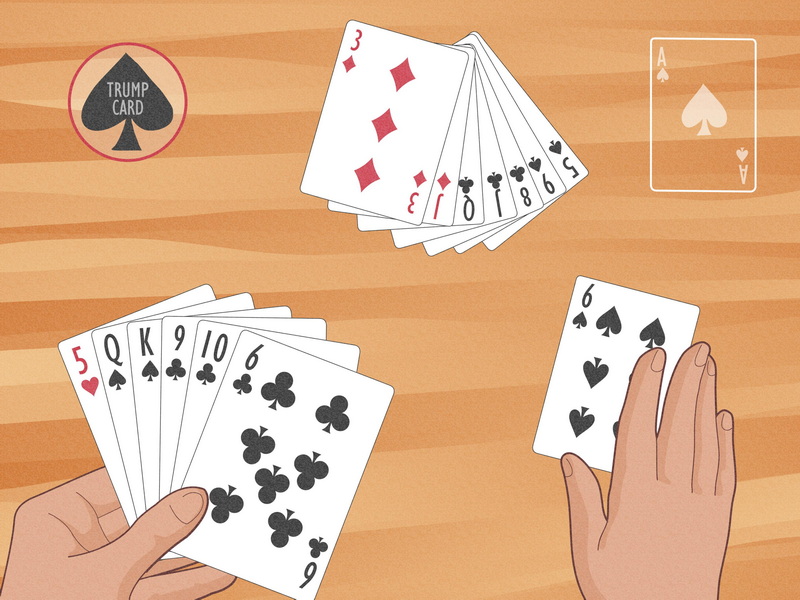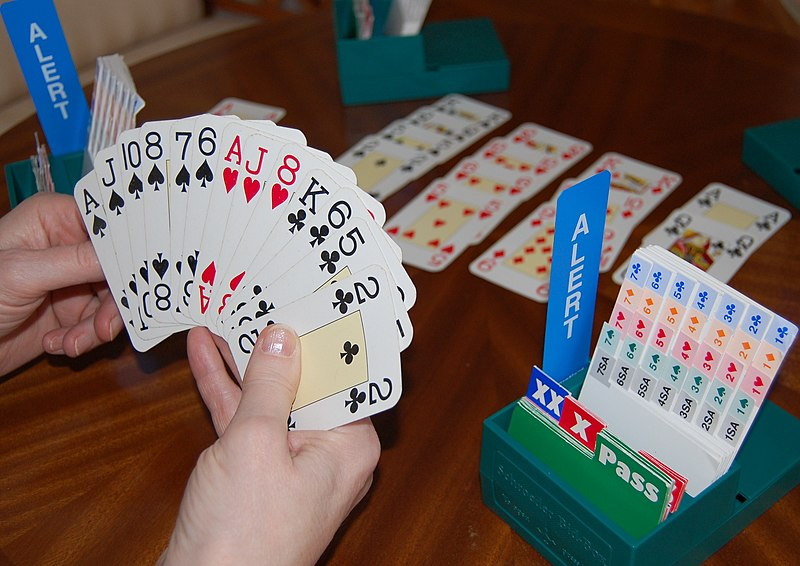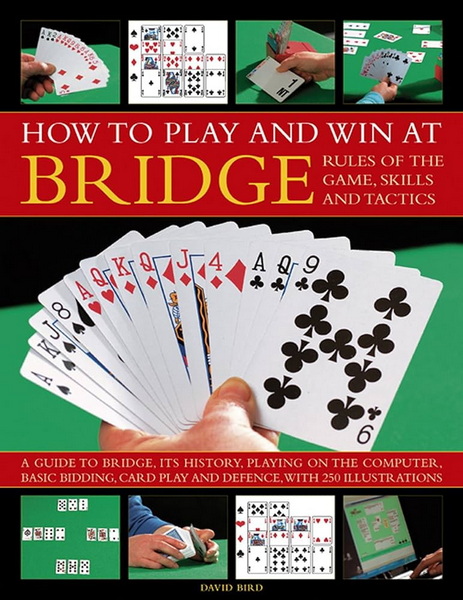Content Menu
● Overview of Bridge
● The Setup
● Bidding Phase
>> Making a Bid
>> Types of Calls
>> Ending Bidding
● Play Phase
>> Opening Lead
>> Following Suit
>> Winning Tricks
● Scoring in Bridge
>> Basic Scoring Rules
>> Bonuses
● Strategies for Playing Bridge
>> Communication with Partner
>> Counting Points
>> Playing Techniques
● Advanced Techniques
>> Defensive Play
>> Endplay Techniques
● Conclusion
● Related Questions
>> 1. What are some common bidding conventions in bridge?
>> 2. How do I improve my defensive skills in bridge?
>> 3. What should I do if I have a weak hand?
>> 4. How do I keep track of tricks won during play?
>> 5. What resources can help me learn more about bridge?
● Citations:
Bridge is a complex yet rewarding card game that requires skill, strategy, and teamwork. Played with four players in two partnerships, it is a game of trick-taking where the objective is to win as many tricks as possible based on the bids made during the auction phase. This guide will cover the fundamental rules, strategies, and nuances of playing bridge, providing you with a solid foundation to enjoy this classic card game.

Overview of Bridge
Bridge is played with a standard 52-card deck and involves four players who sit opposite each other at a table. The players are designated as North, East, South, and West, with North-South forming one partnership and East-West forming the other. Each player receives 13 cards after the deck is shuffled and dealt.
The game consists of two main phases:
- Bidding Phase: Players bid to determine how many tricks their partnership expects to win.
- Play Phase: Players play their cards in an attempt to win the number of tricks they bid.
The Setup
Before starting a game of bridge, follow these steps:
- Gather Players: You need four players. They should be seated in pairs facing each other.
- Shuffle and Deal Cards: The dealer shuffles the deck and deals 13 cards to each player one at a time, moving clockwise around the table.
- Organize Cards: Players should sort their cards by suit for easier play.
Bidding Phase
The bidding phase is crucial as it sets the stage for the play phase. Here are the key components:
Making a Bid
- Players take turns making bids starting with the dealer and proceeding clockwise.
- A bid consists of two parts: a number (indicating the total tricks the partnership aims to win) and a suit (indicating which suit will be trump if applicable). For example, a bid of "1 Heart" means that the player believes their partnership can win at least seven tricks (six plus one).
- Bids can also be made for "No Trump," meaning there will be no trump suit.
Types of Calls
- Pass: Indicates that a player does not wish to bid.
- Double: If a player believes that the opposing team will fail to make their bid, they can double it, increasing the stakes.
- Redouble: If an opponent has doubled your bid, you can redouble it to increase potential rewards.
Ending Bidding
Bidding continues until three consecutive players pass after the last bid. The highest bid becomes the contract for that hand.
Play Phase
Once bidding concludes, players enter the play phase where they try to win tricks based on their bids.
Opening Lead
The player seated to the left of the declarer (the player who made the highest bid) makes the opening lead by playing any card from their hand face up on the table.
Following Suit
Players must follow suit if they can:
- If a spade is led and you have spades in your hand, you must play one.
- If you do not have cards in that suit, you may play any card from your hand.
Winning Tricks
A trick consists of four cards played—one from each player:
- The highest card in the suit led wins unless a trump card is played. In that case, the highest trump wins.
- The winner of each trick leads for the next trick.

Scoring in Bridge
Scoring in bridge can be complex but is essential for understanding how well you performed during a game:
Basic Scoring Rules
- Each trick won above six counts towards your score.
- Points vary based on whether you are playing with trumps or no trumps:
- Minor suits (Clubs and Diamonds): 20 points per trick.
- Major suits (Hearts and Spades): 30 points per trick.
- No Trump: 40 points for the first trick over six; 30 points for each additional trick.
Bonuses
Additional bonuses may apply based on specific achievements during gameplay:
- Completing a contract earns bonus points.
- Overtricks (winning more tricks than contracted) also add points to your score.
Strategies for Playing Bridge
To excel at bridge, players should consider various strategies:
Communication with Partner
Effective communication through bidding and card play is vital for success in bridge. Use conventional bids to convey information about your hand's strength and distribution.
Counting Points
Understanding high card points (HCP) helps evaluate your hand's strength:
- Aces = 4 points
- Kings = 3 points
- Queens = 2 points
- Jacks = 1 point
This evaluation helps determine whether to open bidding or respond to partner's bids.
Playing Techniques
Utilize various techniques during play:
- *Finessing*: A method used to win tricks by playing lower cards strategically when higher cards are held by opponents.
- *Establishing Long Suits*: Focus on developing long suits where lower cards become winners once opponents' higher cards are played out.
Advanced Techniques
As players become more experienced, they can explore advanced strategies such as:
Defensive Play
Defensive strategies involve anticipating opponents' moves while protecting your own hand's strength:
- Signal intentions through card plays (e.g., leading high or low cards).
- Use communication cues with your partner during defense.
Endplay Techniques
Endplay strategies involve forcing opponents into unfavorable positions by controlling which suits they must play while maintaining control over others.
Conclusion
Bridge is not just a game of luck; it requires strategic thinking, effective communication, and teamwork between partners. By mastering its rules and developing strong bidding and playing strategies, players can enjoy this intellectually stimulating game while enhancing their skills over time.

Related Questions
1. What are some common bidding conventions in bridge?
Bidding conventions include Stayman (asking partner about major suits), Blackwood (asking for aces), and Gerber (asking for aces after a no-trump opening).
2. How do I improve my defensive skills in bridge?
Focus on counting cards played, understanding your partner's signals, and practicing defensive strategies like leading through strength or signaling weakness.
3. What should I do if I have a weak hand?
If you have fewer than 12 high card points, consider passing or making a low bid that reflects your hand's potential without overstating its strength.
4. How do I keep track of tricks won during play?
Designate one player from each partnership to gather won tricks face down in an organized stack so that all players can easily keep track of how many tricks have been won.
5. What resources can help me learn more about bridge?
Books like "Bridge for Everyone," online tutorials on platforms like YouTube or specialized bridge websites, and joining local bridge clubs are excellent ways to enhance your understanding of the game.
Citations:
[1] https://www.nofearbridge.co.uk/howtoplaybridge.php
[2] https://www.youtube.com/watch?v=TPZEEjvL9e8
[3] https://www.247bridge.com/news/bridge-strategy-mastering-the-game-online/
[4] https://www.bridgeworld.com/pages/learn/elementary/lesson6.html
[5] https://bridgechamp.com/blog/advanced-bridge-defense-techniques/
[6] https://www.funbridge.com/how-to-play-bridge
[7] https://bicyclecards.com/how-to-play/bridge
[8] https://www.ateacherfirst.com/bridge-lessons/step1/
[9] https://playingcarddecks.com/blogs/how-to-play/bridge-game-rules
[10] https://www.bridgewebs.com/duplicatelite/BridgeTipsHandout.pdf
[11] https://www.funtrivia.com/en/Hobbies/Bridge-5911.html
[12] https://milanbridge.com/basic-rules-of-bridge/
[13] https://www.dummies.com/article/home-auto-hobbies/games/card-games/bridge/bridge-for-dummies-cheat-sheet-208369/
[14] https://www.britannica.com/topic/bridge-card-game/How-to-play-contract-bridge
[15] https://www.ateacherfirst.com/bridge-lessons/step1/
[16] https://en.wikipedia.org/wiki/Contract_bridge
[17] https://www.funbridge.com/how-to-play-bridge
[18] https://kwbridge.com/self.htm
[19] https://www.britannica.com/topic/bridge-card-game
[20] https://bicyclecards.com/how-to-play/bridge
[21] https://www.playgroundequipment.com/a-beginners-guide-to-playing-bridge/
[22] https://www.youtube.com/watch?v=2IomnCvxWzM
[23] https://www.youtube.com/watch?v=Arq3t0iHfPE
[24] http://www.rpbridge.net/rppl.htm
[25] https://www.reddit.com/r/bridge/comments/5yzl5f/is_there_a_good_strategy_guide_for_getting_tricks/
[26] https://www.pokernews.com/card-games/bridge/bridge-strategy-tips.htm
[27] https://kwbridge.com/tips.htm
[28] https://en.wikipedia.org/wiki/List_of_play_techniques_(bridge)
[29] https://www.youtube.com/watch?v=RnfnXw0LmAc
[30] http://youth.worldbridge.org/quick-tips-for-improving-your-bridge-game/
[31] https://www.60secondbridge.com/lessons/scoring-and-tricks/
[32] https://en.wikibooks.org/wiki/Bridge/Playing_Techniques
[33] https://www.reddit.com/r/bridge/comments/16l2vec/i_would_like_to_learn_and_play_bridge_what_would/
[34] https://www.reddit.com/r/bridge/comments/nsnm7y/never_played_bridge_have_a_bit_of_a_naive_question/
[35] https://www.officialgamerules.org/card-games/bridge
[36] http://www.rpbridge.net/rpqz.htm
[37] https://boardgames.stackexchange.com/questions/tagged/bridge
[38] https://www.60secondbridge.com/lessons/acol-hand-evaluation-quiz/
[39] https://www.bridgebase.com/forums/topic/88453-some-bridge-questions-and-computer-answers/
[40] https://scholar.harvard.edu/files/rzeckhauser/files/appendix-bridge_quiz_and_answers.pdf
[41] https://www.reddit.com/r/bridge/comments/6zb0sk/how_do_people_even_get_into_this_game/
[42] https://boardgames.stackexchange.com/questions/61157/bridge-bidding-question-as-responder-with-one-point
[43] https://boardgames.stackexchange.com/questions/11437/what-are-some-good-introductory-rules-to-bridge
[44] http://www.mindracer.com/bidding.htm
[45] https://www.reddit.com/r/explainlikeimfive/comments/1joywl/eli5_the_rules_and_general_info_of_the_card_game/
[46] https://andersonsbookshop.com/book/9781493069576
[47] https://web2.acbl.org/documentLibrary/learn/minibridgeRules.pdf































